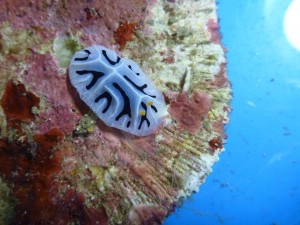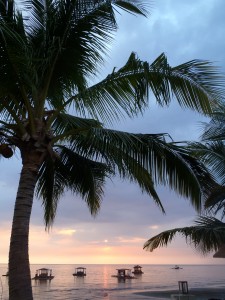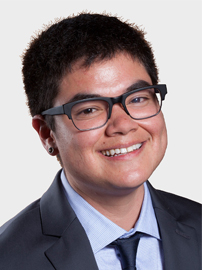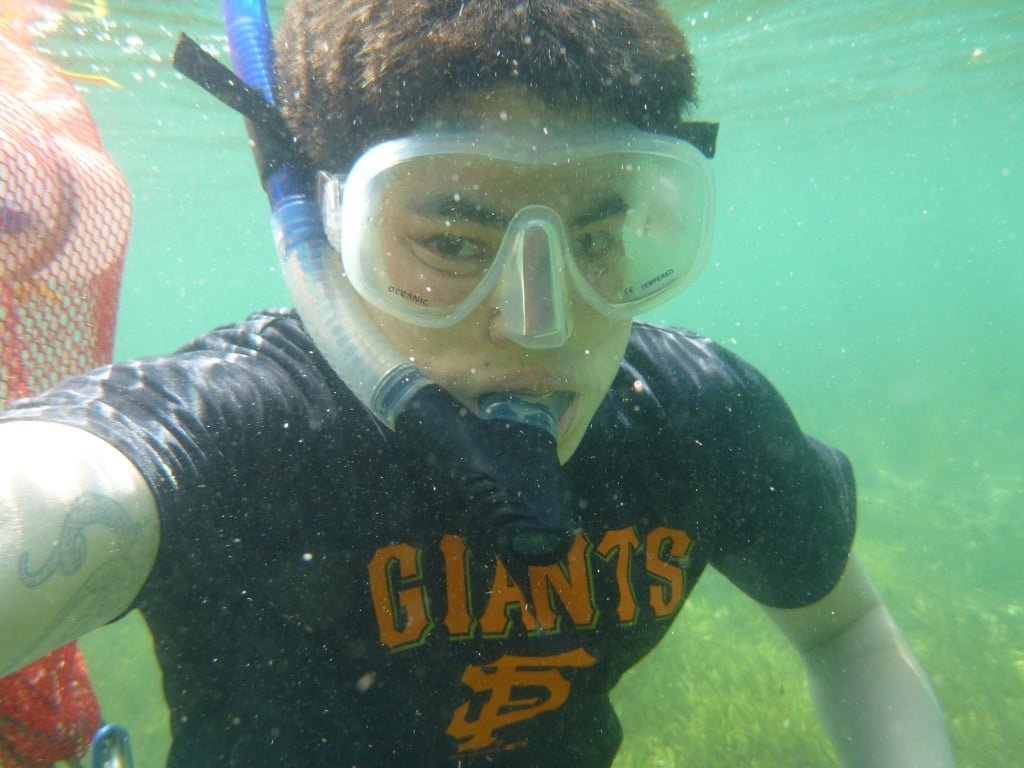by Point Scholar Shayle Matsuda
Last year, 2015, was a big year. I defended my biology masters’ thesis, became a Point Scholar, and packed up and moved to a tiny island in the middle of the ocean to start my Ph.D. January 2016 marked my second year on testosterone, and as I prepare to dive in and start my research on coral reefs, I’m reflecting on how much has changed since my first field expedition and what I wish I would’ve known.
In 2014, I found myself in the Indo-Pacific on my first field expedition as a graduate student, running around grabbing plastic ice cream spoons. Our team was documenting the marine biodiversity in one of the world’s greatest “hot spots” and as it turns out, the forceps I’d packed were no match for the simple plastic spoon as the ideal sorting tool for collecting sea slugs. Little did I know, field tools would be the least of my concerns when it came to the surprise challenges of working in the field.
Fieldwork gives us the opportunity to put years of study into practice; we gather data foundational to our dissertation, and the experience itself can be incredibly rewarding. But as the name suggests, fieldwork is work: physical, mental, and emotional. Conditions can be unpredictable and try as you might, you won’t be able to foresee or prepare for everything. If you’re a transgender male graduate student, be prepared for fieldwork to take on especially unique challenges that your colleagues who identify with the gender they were assigned at birth (or on the Internet) won’t prepare you for. While we all fly by the seat of our pants our first time in the field, you don’t want to get caught with your pants down - a little planning can go a long way.
Are you in or “out”?
Where you are in the process of transitioning and who you are out to will present different challenges. You won’t be able to escape your driver’s license or passport ID, and remember that your legal name and gender will appear on travel documents. A conversation with who will be booking your travel is worth it. This is especially important if you are not out, as getting stopped by airport security isn’t an ideal way for your colleagues to learn you’re trans.

A sea slug in the ocean - plastic spoons not pictured.
Because my advisor knew I was trans, we were able to have the roommate assignment conversation before the trip. My options were to room with a senior-level male or a female graduate student. Both options had their challenges. On the second day of the expedition, my cis-male roommate walked in on me during a hormone injection. It solved the question of how I was going to come out to him, but could have been dicey.
Field accommodations can range from tightly packed tents to boats, home-stays, dorms, buses, living rooms, you name it, but they are rarely private and often gender segregated. Consider where you will change clothes, if you’ll be more comfortable sleeping with a packer or in a binder (bad idea), and where you’ll hang your clothes to dry.
Trans Health
For Transmen, health care can become even more complicated in the field, but there is a lot you can do to keep yourself out of the clinic. Peeing is one of them. Have a plan: bring an STP (stand-to-pee), find out where the remote restrooms are, and pee in your wetsuit if you have to just go.
Besides the essential toiletries, toss in antibiotics for food poisoning (you’ll need to get a prescription), UTI medication if you’re prone, face/body wipes, and yeast infection and menstrual supplies depending on your hormone/surgery status – you’ll be happy to avoid purchasing them later.
For those of us on hormones, pack more than enough supplies. A quick tip - locking-cap prescription bottles work great as travel sharps containers. Think about what you’ll say if someone questions you or is being nosey about your “medical condition.” When I realized I couldn’t easily give myself an injection on the top bunk, I asked the staff if I could slip into an empty room. When someone casually asked what my medical condition was, I blurted out the first thing I could think of that requires needles because I didn’t want to out myself.
You’re not alone
Finally, don’t forget about self-care. At the time, an increase in my hormone dose, being accidentally “she-ed’ early in my medical transition, and dealing with the compounded stress of being transgender and doing field work added up to a realization of how hard it was without my support network. It was also distracting to my field performance. Pushups and coffee helped, finding a friend to confide in helped more.

With all that hard work, it's a wonder Shayle ever has time to enjoy the view!
There are some great opportunities to plug into communities or find resources including oSTEM, Point Foundation, and Queer in STEM, and many other smaller discussion groups exist on Tumblr, Twitter, and Facebook. Remember, you are not alone.
In the end
By the end of the trip, my professional toolkit had grown to include straws, “specialized” duct-tape and zip-tie collection containers, and airplane food dishes. I also figured out how to layer for 100+ degree weather while still feeling confident and comfortable. Finally, after a successful sea slug sorting session with an ice cream spoon, my advisor said the words I’d been waiting to hear – “That’s a new species.” Spending a little extra time planning and packing will ensure you’re ready to hit the ground running and prepared to face the “regular” joys and challenges of your first time in the field.
This post was written by Point Scholar Shayle Matsuda
 Shayle studies climate change and reef coral resilience as a Ph.D. candidate at the University of Hawaii Manoa and the Hawaii Institute of Marine Biology (2020). Actively involved in science communication, he frequently speaks about his research and experience being a transgender scientist. Shayle hosts the interactive science event series Science, Neat that brings science and LGBTQ communities together. He uses art and digital media to make science more accessible to wider audiences, and he facilitates unique research experiences for high school students underrepresented in STEM fields.
Shayle studies climate change and reef coral resilience as a Ph.D. candidate at the University of Hawaii Manoa and the Hawaii Institute of Marine Biology (2020). Actively involved in science communication, he frequently speaks about his research and experience being a transgender scientist. Shayle hosts the interactive science event series Science, Neat that brings science and LGBTQ communities together. He uses art and digital media to make science more accessible to wider audiences, and he facilitates unique research experiences for high school students underrepresented in STEM fields.
Read more about Shayle and follow him on Twitter - @wrong_whale.

